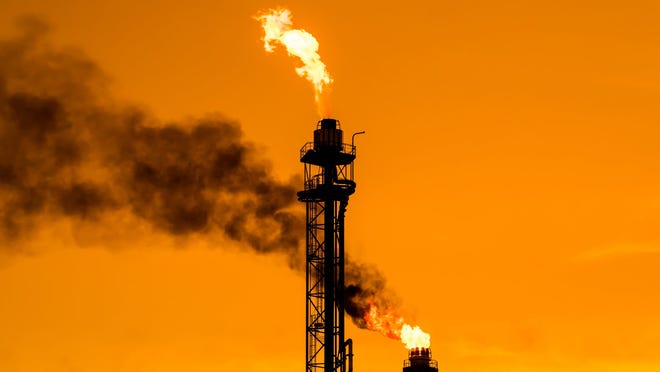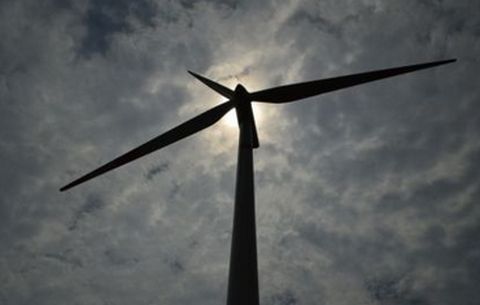By: Dierdre Shesgreen, USA Today
April 22, 2021
WASHINGTON – President Joe Biden pledged to cut U.S. greenhouse gas pollution in half by 2030 at a virtual climate summit Thursday, outlining an aggressive target that would require sweeping changes to America’s energy and transportation sectors.
“These steps will set America on a path of a net-zero emissions economy by no later than 2050,” Biden said as the White House opened the two-day summit, attended by 40 leaders from around the world.
“Scientists tell us that this is the decisive decade, this is the decade we must make decisions that will avoid the worst consequences of a climate crisis,” Biden said.
The White House’s goal of reducing greenhouse gas emissions by 50% to 52% percent, from a baseline of 2005 emissions, is nearly double the target set by Obama administration in 2015. An administration official, who briefed reporters on the condition of anonymity, did not detail how the White House plans to achieve the 50% reduction in emissions.
“We see multiple paths to reaching this goal,” the official said, noting, for example, that Biden has pledged to make the U.S. power sector 100% carbon-pollution free by 2035.
The virtual summit is aimed at renewing America’s leadership on climate change – and rallying other world leaders to set their own aggressive targets – after four years in which the Trump administration worked to unravel U.S. environmental commitments.
“We are all so delighted to have the United States back,” South Africa’s president, Matamela Cyril Ramaphosa, declared in his remarks at the summit. Boris Johnson, the United Kingdom’s prime minister, called Biden’s pledge “game changing” and offered a blunt retort to those who question the need to address climate change.
“This is not about bunny-hugging,” Johnson said. “This is about jobs.”
Even Pope Francis made a virtual appearance, encouraging world leaders to unify in the face of the climate crisis.
“We must care for nature, so that nature may care for us,” the pope said in his video message, according to a translator. “I wish you great success during this meeting. I will be with you every step of the way.”
In his opening remarks, Biden noted the U.S. represents less than 15% of the world’s emissions.
“No nation can solve this crisis on our own,” he said. “All of us, and particularly those of us who represent the world’s largest economies, we have to step up.”
While other world leaders offered similarly dire assessments of the threat posed by climate change, only a few outlined aggressive new steps to address the crisis. Canada’s prime minister Justin Trudeau said his country would reduce carbon pollution by 40% to 45% by 2030, an increase from Canada’s previous 30% target. Japan’s Prime Minister Yoshihide Suga vowed to reduce emissions 46% below 2013 levels.
But two of the world’s biggest emitters – China and India – did not outline new targets. Chinese President Xi Jinping and Indian Prime Minister Narendra Modi emphasized their existing commitments and said they face greater obstacles than the U.S. and other Western countries.
“China has committed to move from carbon peak to carbon neutrality in a much shorter time span than what might take many developed countries, and that requires extraordinarily hard efforts from China,” Xi said. He reiterated China’s commitment made last year to strive for “peak carbon dioxide emissions before 2030 and achieve carbon neutrality before 2060.”
Too far or not far enough?

Biden’s climate change agenda faces obstacles at home as well. Republicans have vowed to fight his proposals that shift the U.S. energy sector away from coal and other fossil fuels in favor of renewable energy.
Sen. John Barrasso, a Wyoming Republican and fierce defender of the fossil fuel industry, slammed Biden’s 50% emissions-reduction plan, saying it would put the U.S. at a competitive disadvantage globally.
“President Biden is unilaterally committing America to a drastic and damaging emissions pledge,” Barrasso said in a statement Thursday. “As the president sets punishing targets for the country, America’s adversaries like China and Russia continue to increase emissions at will. The last thing the economy needs is higher energy prices and fewer jobs, but that’s exactly what we’re going to get.”
Democrats have embraced Biden’s climate change agenda, even as some press him to go further.
“The Biden administration inherited four years of dust and denialism on climate action, but that era is over,” Sen. Edward Markey, D-Mass, said Thursday. He called Biden’s 50% emissions-reduction target “technologically feasible and well within our reach.” With additional funding and political will, Markey said, “we can do even more to meet the moment on this existential crisis.”
The United States is the second-largest emitter of carbon dioxide (CO2), producing about 5.41 billion metric tons in 2018. China emits nearly twice that amount.
Experts say the world’s major economies need to dramatically scale back their carbon emissions to limit the rise of average global temperatures to 1.5 degrees Celsius, compared to pre-industrial levels. Although the U.S. and other countries are already seeing the impacts of global warming through more extreme weather events, scientists say the effects will become catastrophic and irreversible if the planet’s temperatures exceed the 1.5 degree threshold.
At Thursday’s summit, UN Secretary General Antonio Guterres noted the last decade was the hottest on record and the average global temperature has already risen about 1.2 degrees Celsius above pre-industrial levels.
“Meanwhile, we see ever rising sea levels, scorching temperatures, devastating tropical cyclones and epic wildfires,” Guterres said. “We are at the verge of the abyss.”
Biden has pledged to be the most aggressive president on climate change, setting a goal of de-carbonizing the U.S. power sector by 2035 and reaching net-zero greenhouse gas emissions by 2050. He has already taken several steps to address climate change, such as pausing oil drilling on public lands and halting construction of the Keystone XL Pipeline.
“The Biden-Harris administration will do more than any in history to meet our climate crisis,” Secretary of State Antony Blinken said Monday in a speech previewing this week’s summit. “This is already an all-hands-on-deck effort across our government and across our nation. Our future depends on the choices we make today.”
Blinken and other Biden advisers have countered the GOP criticism by pointing to the economic opportunities in transitioning to a clean-energy economy.
In his speech on Monday, Blinken said that climate change should be viewed not only as a threat but also an opportunity – to create new clean-energy jobs, to build a healthier society and to regain a competitive edge against China.
“It’s difficult to imagine the United States winning the long-term strategic competition with China if we cannot lead the renewable energy revolution,” he said. “Right now, we’re falling behind.”
He noted that China holds nearly a third of the world’s renewable energy patents and is the largest producer and exporter of solar panels, wind turbines, electric vehicles and other innovations.
“If we don’t catch up, America will miss the chance to shape the world’s climate future in a way that reflects our interests and values, and we’ll lose out on countless jobs for the American people,” Blinken said.





